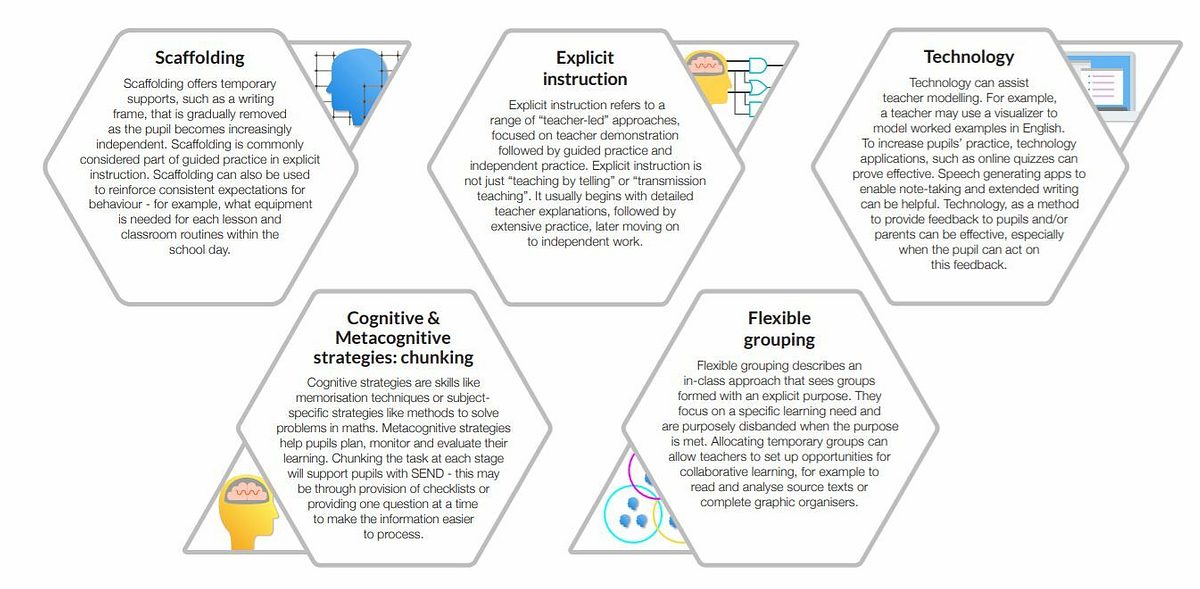
Blog -
Learning Behaviours
Behaviour is often thought of as something negative that gets in the way of learning.

Share on:

by Derby Research School
on the

Westbury Academy/ELE Derby Research School
Beth is an ELE for Derby Research School and Learning & Development Lead for the Raleigh Learning Trust and is the Research Lead at Westbury Academy in Nottingham. She is a Teacher Development Trust Associate in CPD Leadership and has presented on CPD practices and journal clubs for researchED and Transform Teaching School Alliance, establishing a website to support the development of Education Journal Clubs internationally.
The EEF’s ‘Special Educational Needs in Mainstream Schools’ guidance report was published in March 2020 and offers five key recommendations to support pupils with SEND, alongside support to evaluate settings and strategies to implement.

Many elements of the recommendations central to the report are already familiar to practitioners in schools and when presenting these as strategies to support learning, leaders may be faced with “But we already do that” in response. There’s nothing wrong with this and, indeed, hopefully many of the practices are already visible; the trick is to establish a common language around practice to support collaboration and identification of strategies that make it more likely you’re doing the right things at the right time.
Developing a common language for approaches to SEND will enable you to build on what is already happening and drill down into what works where and when, offering a greater consistency for staff and pupils.
Recommendation 3 of the guidance report states ‘ensure all pupils have access to high quality teaching’ and outlines five teaching strategies to consider for use with pupils with SEND:
Flexible grouping
Cognitive and metacognitive strategies
Explicit instruction
Using technology to support pupils with SEND
Scaffolding
Use these themes to frame enquiry into which strategies you are using and in which situations. Identify which members of your team are skilled in implementing each of them, where further professional development might be needed, and what you will stop doing. The guidance report signposts to resources covering each area at a greater depth for when you need it, and to follow up on queries.

It may be useful to breakdown your focus on each strategy across a longer period of time so you can really look at assessing current practice and language, planning your next steps, implementing them and reviewing outcomes. You can do this at whole-school or department level, or shrink the task down and establish pilot groups which allows you to evaluate progress, make subtle changes and, when it comes to a wider roll-out, share the successes to support change.
Establishing a common language requires all staff to be involved, particularly support staff.
Recommendation 5, ‘work effectively with teaching assistants’ reiterates a lot of what is presented in the EEF’s guidance report ‘Making Best Use of Teaching Assistants’ and sets out how leaders should pay attention to how teaching assistants are deployed to support pupils with SEND. It is important that these colleagues are given the opportunity to offer their expertise in working with differing pupil needs and are party to the rationale behind strategies they will be asked to implement.
Once there is agreement over which strategies work well and how you will collectively refer to them, implementation becomes less of a lottery, information can be shared across teams and with the wider school community. You will be able to have a clearer picture of what works, where; and a collective knowledge of why it’s working. As your school community changes with new staff and pupils, this language can be passed on – making meaning less of a guessing game and establishing working routines more easily.
Good teaching for pupils with SEND is good teaching for all, and the language you develop collectively to support pupils with SEND, will allow you to support all pupils with greater consistency and depth.
A learning behaviour can be thought of as a behaviour that is
necessary in order for a person to learn effectively in the group
setting of the classroom.
We know that pupils with SEND have the greatest need for high
quality teaching and that what is good for pupils with SEND is good
for all. We must understand individual learning needs and include
pupils, parents, colleagues and specialist professionals in our
conversations.
If you would like more support in creating a shared language when teaching students with SEND in the mainstream, book onto our courses that are linked throughout this blog.
Alternatively, book onto our SEND series of professional development opportunities below.

Blog -
Behaviour is often thought of as something negative that gets in the way of learning.

In the news -
Take a read of our March 2024 newsletter…

Blog -
A Case Study of a School’s Approach to Developing Social and Emotional Learning Through Zones of Regulation.
This website collects a number of cookies from its users for improving your overall experience of the site.Read more